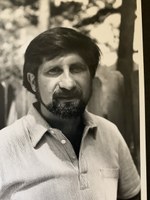
Born in Brooklyn in 1941, Eugene Lunn joined the Davis Department of History as a modern European intellectual and cultural historian in 1970. After graduating from Brandeis University in 1962, he received his Ph.D. degree from UC Berkeley in 1968. He taught for two years at Reed College, before joining the Davis faculty.
Eugene Lunn was a passionate man. He lived the life of the mind with unfaltering intensity and with a noble conception of the role in the modern world of the critical intellectual. He was profoundly alive both to the tragedy and the promise of human history. This sensibility, paired with his analytical powers and clarity of expression, made him a man of rare presence and an exceptionally gifted teacher. His very well-attended lecture courses on modern European intellectual history enjoyed the highest possible reputation among undergraduates, graduate students, and members of the faculty. He possessed a great talent for intelligibly conveying the ideas of the most difficult thinkers while submitting them to fair-minded but unsparing analytical and ethical critiques. For very many students, Lunn's courses were a first revelation of the power of ideas not only in history and society, but in one's own personal life. In 1989 Professor Lunn received the Magnar Ronning Award for Teaching Excellence, conferred autonomously by the student body through the office of the Student Viewpoint.

Eugene Lunn wrote, in an engaging prose, two books of major importance. The first of these was Prophet of Community: The Romantic Socialism of Gustav Landauer (University of California Press, 1975). Among the virtues of this study was Lunn's richly nuanced analysis of Landauer's efforts to integrate into his project of an anarchist communitarian democracy the concept of the Volk, which historians had hitherto regarded as the intellectual property of right-wing German nationalists, especially and above all the National Socialists. Lunn's second book was the widely read and admired Marxism and Modernism: An Historical Study of Lukacs, Brecht, Benjamin and Adorno (University of California Press, 1982). In this broad-ranging and subtle work, Lunn analyzed the insights into cultural modernism that resulted from the Marxist critiques, variously idiosyncratic, to which his four protagonists subjected it. Lunn also demonstrated the extent to which what has come to be known as “Western Marxism,” independent of and often opposed to Soviet-bloc orthodoxy, took shape precisely from an aesthetic (and political) critique of the strengths and weaknesses of early twentieth-century cultural modernism.
Eugene Lunn died in 1990, at the age of 48, of cancer. Eugene Lunn’s memory survives in the hearts and minds of the many people who knew him as a splendid teacher, scholar, colleague, and friend. In remembrance of Professor Lunn, the Davis History Department established, in his name, an annual lecture featuring distinguished intellectual historians whose work have inspired their colleagues as well as the broader public. The Eugene Lunn Memorial Lecture Series has become an important tradition at Davis, made possible by the generous donations of time and money by many.
Tribute by
William W. Hagen
Roland Marchand
Ted W. Margadant
Adapted by Kathy Stuart